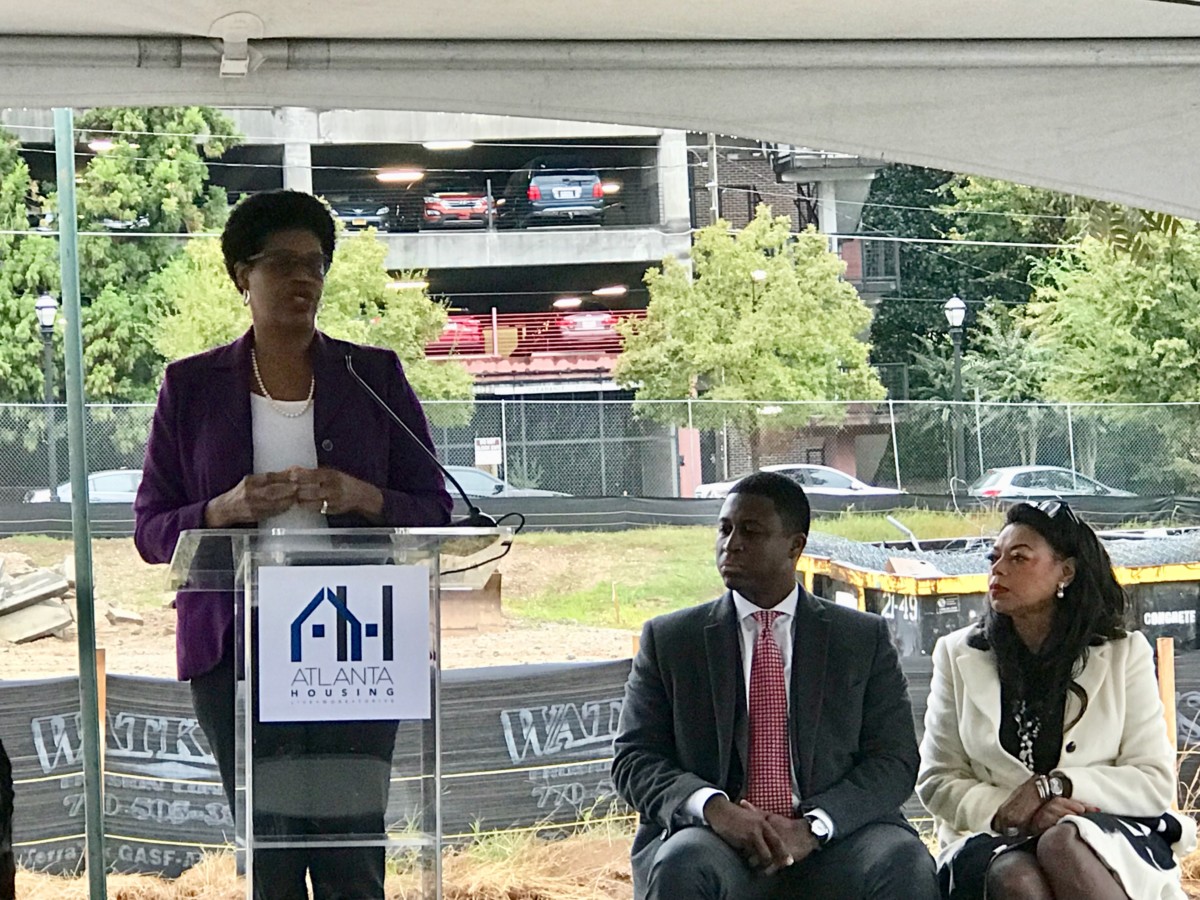
- Select a language for the TTS:
- UK English Female
- UK English Male
- US English Female
- US English Male
- Australian Female
- Australian Male
- Language selected: (auto detect) - EN
Play all audios:
By Maria Saporta The groundbreaking of Ashley 1 at Scholars Landing in the Atlanta University Center campus on Nov. 2 broke more than ground. It broke the ice that had existed for the past
nine years between the City of Atlanta, the Atlanta Housing authority and the Integral Group, a development company specializing in community transformations. The relationship had been
frozen because then-Atlanta Mayor Kasim Reed had a personal dislike for Integral and its CEO Egbert Perry due to the mayor’s attempted and finally successful ouster of Renee Glover, AHA’s
president and CEO. That impasse led to multiple lawsuits and a stalled housing authority where no new units were built during Reed’s administration. The ice began to break in the early days
of Atlanta Mayor Keisha Lance Bottoms’ administration thanks to the intervention of the relatively new regional administrator of the U.S. Department of Housing and Urban Development – Denise
Cleveland Leggett. Early in 2018 – literally weeks after Bottoms had taken office, Leggett had a two-hour meeting with the mayor. If the city did not take drastic moves to fix the Atlanta
Housing Authority and bridge the divide with Integral and Perry, Atlanta likely would lose the $30 million Choice Action grant that had been awarded by HUD in 2015. Almost immediately
changes began to happen. Bottoms pushed out Catherine Buell, who Reed had put in as AHA’s president and CEO and who had followed his marching orders. She was succeeded by Brandon
Riddick-Seals, an AHA board member who stepped in as interim president and CEO. And most of lawsuits between the city, AHA, Integral, Perry and Glover were dropped. Perry and Glover are
still seeking to get their legal bills covered due to having to defend themselves in what they have called were “frivolous” lawsuits. Meanwhile, regional HUD administrator Leggett reminded
the city and AHA that they needed to move forward on their commitments spelled out in the Choice grant. So that brings us up to the groundbreaking on Nov. 2 when Leggett shared the podium
with Mayor Bottoms, Riddick Seals and Vicki Lundy Wilbon, Integral’s president of community development. “I stand before you having doubted if we would achieve what we have done,” Wilbon
said. “I’m thankful to God to be here before you today…. Thank you to the leadership of Denise. You are a true leader. You took the bull by the horns.” After the groundbreaking, several of
the players talked about the past year in a series of interviews. “This has been a year in transition,” Bottoms said. “It’s great to have partners, and I’m glad we are here today. I’m glad
the money is in place.” Asked about what had happened before, Bottoms admitted that she had been “very concerned” about AHA’s former leadership and how pleased she is with the leadership of
AHA Chairman Chris Edwards and Riddick-Seals. “I’m glad we are here with all of our partners,” said Bottoms, adding that the city can now focus on building more affordable housing.
Riddick-Seals called the groundbreaking “one more step in the right direction” as the Atlanta Housing authority goes back to building community and neighborhoods. The new day can be defined
by one word – communications. “When you are already partners, you have to communicate,” Riddick-Seals said. “You don’t have to run to the courtroom to communicate. We are already partners.
This is a renewed focus on housing.” Then he went on to say: “This project was stalled for over a year. We focused. There were some adjustments in leadership. I think it’s the beginning of
more to come.” During her comments at the groundbreaking, Leggett thanked Egbert Perry and Integral for what the company has done for affordable housing in Atlanta and the rest of the
country. Later, in an interview, Leggett explained that HUD has been a partner of AHA’s for decades. And she is happy played a role in bringing the relationship back to where it needs to be
so that Atlanta didn’t lose the Choice grant. “Atlanta has a rich history of implementing HUD programs and funding,” she said. The influence is not just here in Atlanta, but nationally. I
wanted to make sure that legacy continues. I’m was just making sure we stayed on track with all the project. “There were private conversations between the mayor and I and AHA. No one wants
to lose funds, especially the Choice grant,” she continued. “It was critical that we move forward and that the new housing authority provided the leadership necessary. Because of that
collaboration and leadership, we are here today.” Perhaps no one summed up the situation better than Christopher Nunn, commissioner of the Georgia Department of Community Affairs.
“Collaboration is good,” Nunn said. “When AHA, the city, DCA come together with Integral, we can solve just about anything.” _RELATED POSTS_








